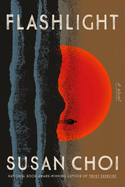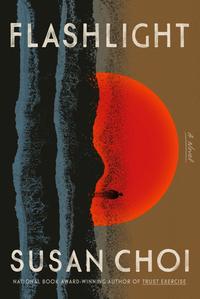
 National Book Award-winner Susan Choi (Trust Exercise) presents another gripping novel with Flashlight. In the opening scene, 10-year-old Louisa and her father go for an evening walk on the beach with a flashlight to guide them, to gaze at the sea that separates Japan from Korea. That night, Louisa washes up on the beach barely conscious yet alive, but her father does not. When someone discovers her, Louisa reports that her "father was kidnapped."
National Book Award-winner Susan Choi (Trust Exercise) presents another gripping novel with Flashlight. In the opening scene, 10-year-old Louisa and her father go for an evening walk on the beach with a flashlight to guide them, to gaze at the sea that separates Japan from Korea. That night, Louisa washes up on the beach barely conscious yet alive, but her father does not. When someone discovers her, Louisa reports that her "father was kidnapped."
The novel shifts among the perspectives of Louisa and her parents--Anne, a native Ohioan, and Serk Kang, a Japanese-born man of Korean descent--as well as Tobias, born of an affair Anne had before she met Serk, with a married man who insisted that he and his wife adopt Tobias. Choi's ability to make coincidences seem inevitable makes this a delicately balanced drama.
Soon after the beach incident, other strange details surface. Tobias, who traveled to Japan and secretly met with Anne weekly while she was living there, encounters one Japanese couple who believes their daughter was kidnapped. Choi feeds to readers seemingly disparate clues that coalesce in a tale of espionage and global conflict, and the heartrending ways in which world struggles play out in individual lives.
Anne, Serk, and Louisa waver between acts of tenderness and cruelty. Anne suffered great loss in giving up Tobias in her early 20s, a fact she kept from Serk. Serk saw his only future in his academic studies in Japan, refusing to follow his parents to their native Korea, a fact he kept from Anne. They met in the 1960s in the U.S. and their options were few: "The world had not been fit for either of them; this suggested they were fit for each other." Both Anne and Serk live in fear, but rather than confide those fears to each other, they grow increasingly remote, especially when Serk's career takes the family back to Japan. Louisa internalizes her parents' strategy. When Anne develops physical symptoms, "losses of normal sensation, and gains of ghost sensations that shouldn't exist," Louisa thinks her mother is faking an illness. Even years later, when Anne is diagnosed with multiple sclerosis, Louisa cannot show her mother kindness.
Choi has a gift for instilling empathy in readers as she shows her characters' flaws; she gives insight into the tools Anne, Serk, and Louisa developed in order to protect themselves, even as they push one another away and cling to their secrets. Yet there is hope for Louisa--who by the end of Flashlight has opened her mind and can perceive a world outside herself. --Jennifer M. Brown
Shelf Talker: In this gripping novel, Susan Choi's seemingly disparate clues coalesce in a tale of espionage and global conflict, and the heartrending ways in which world struggles play out in individual lives.

